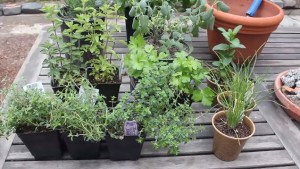Garden Herbs which Can Help Your Health Benefits
 Herbs are excellent in the kitchen especially when used by a highly skilled chef who truly understands the unique attributes and characteristics of these herbs. What you may not know is that many of the common-looking herbs you can find on the side of the road or perhaps on your neighbor’s backyard actually have a lot of health benefits. In some countries, several herbs have been systematically grown because of their proven medicinal properties. Some of these have been shown to be effective against some common ailments such as upper respiratory tract infection, urinary tract infection, burns, skin infections, and gastrointestinal problems.
Herbs are excellent in the kitchen especially when used by a highly skilled chef who truly understands the unique attributes and characteristics of these herbs. What you may not know is that many of the common-looking herbs you can find on the side of the road or perhaps on your neighbor’s backyard actually have a lot of health benefits. In some countries, several herbs have been systematically grown because of their proven medicinal properties. Some of these have been shown to be effective against some common ailments such as upper respiratory tract infection, urinary tract infection, burns, skin infections, and gastrointestinal problems.
If you want to learn more about the different herbs that have medicinal or health benefits you can logon to the Essential Health Foods FB page for more information. Alternatively you can get in touch with them through their Contact Us page.
Nevertheless, here are some of the world’s garden herbs that have been proven to provide excellent health benefits.
- Aloe Vera – This beautiful yet prickly-edged, cactus-like herb has many health benefits including the treatment of chronic constipation, skin allergies, digestive problems, minor burn injuries, ulcerative colitis, eczema, and wounds and cuts. Aloe vera is an excellent skin moisturizer and as such are known to be excellent for improving skin conditions.
- Basil – A mainstay in Italian tomato-based sauces, this aromatic herb (Ocimum basilicum) is not only full of flavor; it is also full of medicinal benefits that can include the management of gas, wounds, abrasions, and cuts. Known as the King of Herbs, basil has been shown to contain very powerful antioxidants which can play an important role in cancer prevention. Additional studies show that basil may be used as a supplementary treatment for asthma, diabetes, and stress.
- Fenugreek – Officially known as Trigonella foenum-graecum, this mainstay herb of Indian dishes is excellent for the management of diabetes as well as in helping breastfeeding mothers to produce more milk for their babies. In certain parts of the world, fenugreek is used as a regulator of weight.
- Lemon Balm -Officially known as Melissa officinalis, the lemon balm has been a mainstay in Austrian traditional medicine as treatment for a variety of diseases of the gastrointestinal system including the liver and the gall bladder. Some nervous system disorders have also been shown to be managed with lemon balm. In other countries, lemon balm has been extensivel used in the management of depression, insomnia, headaches, fever, stomach upset, and cough and cold.
- Marsh Mallow – The plant from which your favorite picnic barbecue treat is made from, the roots, leaves, and flowers of the marsh mallow plant, known scientifically as Althaea officinalis, has been shown to be an excellent treatment for gastric ulcers as well as mouth and throat ulcerations. Additionally, it has been shown to be quite good in treating insect bites, skin inflammations, wounds and bruises, and aching muscles.
- Parsley – One of the most common herbs used in culinary masterpieces either as an ingredient or as garnishing, parsley or Petroselinum crispum, has been shown to contain certain flavonoids and antioxidants that are beneficial in the provision of optimum health. Additionally, parsley contains folic acid, Vitamin A, Vitamin K, Vitamin C, lycopene, lutein, beta- and alpha- carotene, and zeaxanthin. Flavonoids have been extensively studied in their ability to reduce inflammation, prevent certain cancers, possess antibacterial properties, and reduce mortality associated with cardiovascular diseases.
- Peppermint – A member of the mint family, peppermint or Metha piperita has been extensively used in the management of irritable bowel syndrome. Additionally, peppermint has been commonly used to mitigate the symptoms of nausea and vomiting, indigestion, bloating, and abdominal pain. In some cases, peppermint has been shown to be quite effective in improving memory and enhancing alertness although additional studies may need to be undertaken.
- Pot Marigold -Also known as Common Marigold or Garden Marigold or its scientific name Calendula officinalis, pot marigold is a beautiful ornamental flowering plant that has so many health benefits. It is excellent for the management of hyperthermia, varicosities, infections, wounds, insect bites, and sore eyes.
- Sage – This slight peppery and savory herb, Salvia officinalis, often used in fish and meat dishes, has been shown in studies to be effective in improving the cognitive and behavioral functioning of patients with Alzheimer’s disease. Other more common health indications of sage include optimum digestion and the management of menopausal symptoms, periodontal diseases, and skin infection.
- Thyme – This aromatic herb excellent for steaks, and a cousin of an equally aromatic herb the oregano, is also good for relieving pulmonary congestion enabling the individual to breathe more optimally. Additionally, thyme is often indicated in the management of cough and bronchitis as well as the build-up of gas.
These are just some of the garden herbs you might want to grow in your own backyard. If you are not sick, you can always use some of these for other purposes especially in concocting a delicious and nutritious meal for your family.



